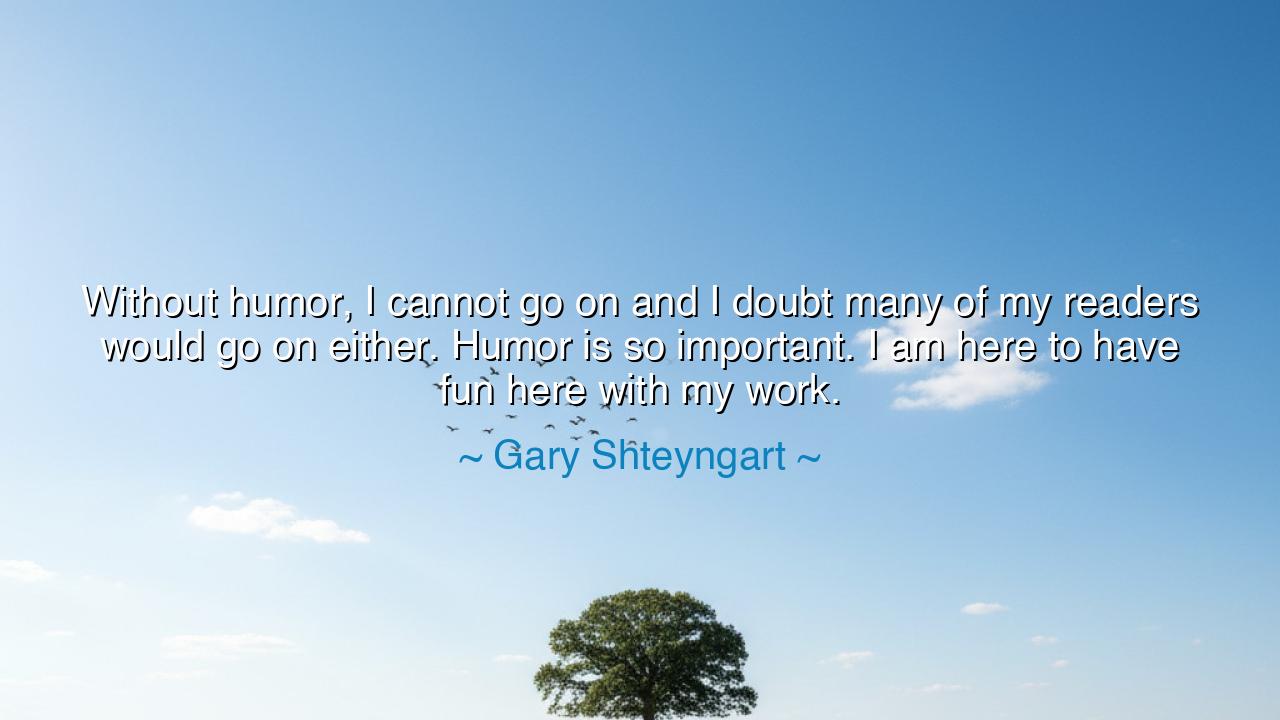
Without humor, I cannot go on and I doubt many of my readers
Without humor, I cannot go on and I doubt many of my readers would go on either. Humor is so important. I am here to have fun here with my work.






“Without humor, I cannot go on and I doubt many of my readers would go on either. Humor is so important. I am here to have fun with my work.”
Thus spoke Gary Shteyngart, a writer whose laughter carries the weight of survival, and whose jest is the child of both pain and hope. In these words, he does not simply speak of writing, but of living — for to live, as to create, is to walk through darkness seeking light. His declaration that humor is essential is no small confession; it is the wisdom of one who knows that laughter is the soul’s defense against despair. He reminds us that the heart, weary with truth, must be lifted by joy if it is to endure the long road of existence.
To say “Without humor, I cannot go on” is to admit that life’s burdens are too heavy to carry on strength alone. It is to acknowledge that logic, reason, even ambition, will all fail when the spirit loses its song. Humor, then, is not triviality but sacred medicine, the fire that warms the weary traveler on a cold night of uncertainty. Shteyngart, whose stories often dance between tragedy and absurdity, knows that laughter can reveal truth better than solemnity — for the human condition is too vast to be understood without irony. To laugh, truly laugh, is to recognize one’s own frailty and still move forward.
In the ancient world, the philosopher Democritus of Abdera was called “the laughing philosopher,” for he met the follies of mankind not with rage, but with mirth. He saw that the world, full of contradiction and vanity, could only be understood through the eyes of humor. To weep endlessly for humanity’s errors was to drown in them; to laugh was to rise above them. So too does Shteyngart follow this lineage — the lineage of the wise who laugh, who transform sorrow into play, confusion into comedy, and truth into something bearable. For humor, rightly used, does not escape pain; it transcends it.
“I doubt many of my readers would go on either,” he says — for he knows that art, like life, is sustained by delight. A story without humor is like a world without sunlight: it may exist, but it does not grow. Even in tales of suffering, laughter opens the door to empathy. It softens the sharpness of judgment and reminds us that all hearts beat with the same rhythm of folly and forgiveness. The ancient dramatist Aristophanes wielded humor as a weapon and a balm alike — mocking the powerful, comforting the powerless, and revealing that laughter can speak truth where anger fails. So too does Shteyngart teach that the creator’s duty is not to preach, but to play — to find joy amid ruin and share it freely.
“I am here to have fun with my work,” he declares — and though the words sound light, they carry a profound creed. For to find joy in one’s labor is the truest mastery of life. The wise of every age have sought this state — not the dull comfort of ease, but the radiant energy of play. Play, in its highest form, is the dance of creation. When one works not as a servant to duty, but as a child of wonder, the world itself becomes luminous. Shteyngart’s “fun” is not laziness; it is the freedom of spirit that allows art, and the artist, to live fully. Without such joy, both the writer and the reader perish in the grey weight of seriousness.
Consider the story of Charlie Chaplin, who rose from the gutter to become one of the world’s greatest artists — and whose laughter carried the echo of hunger, loss, and perseverance. When asked why he made people laugh, he said, “To truly laugh, you must be able to take your pain and play with it.” In that saying lies the essence of Shteyngart’s wisdom. Humor is not the absence of suffering; it is the transformation of suffering into art, into something beautiful and human. Chaplin’s silent laughter and Shteyngart’s witty prose are born of the same truth: that only by embracing absurdity can we survive it.
So, let this lesson be written upon the hearts of all who create and live:
-
Honor humor — it is not weakness, but wisdom disguised in joy.
-
Work with play, for the spirit thrives in freedom, not in fear.
-
Laugh at yourself, that pride may never own you and despair may never devour you.
-
Bring laughter to others, for in doing so, you give them the strength to continue their own journey.
Thus, Gary Shteyngart’s words stand among the timeless teachings: that humor is both shield and sword, both solace and strength. To live without it is to walk through life unarmed. For when laughter lives within us, even sorrow must bow to it. The wise will remember: in laughter there is truth, in joy there is resilience, and in play there is immortality. So let us, like Shteyngart, work with laughter on our lips — for in that laughter, life itself finds its most beautiful form.






AAdministratorAdministrator
Welcome, honored guests. Please leave a comment, we will respond soon